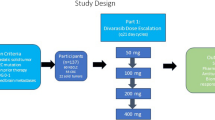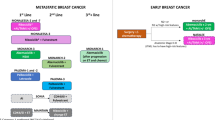Summary
Background: The objective of this phase I study was to determine the maximal tolerated dose (MTD) of the combination of weekly docetaxel and exisulind in patients with advanced solid tumors. Patients and methods: Patients with advanced or refractory solid tumors were treated with intravenous weekly docetaxel with daily oral exisulind. The following dose levels (docetaxel/exisulind) were explored: 30-mg/m2/200 mg po bid, 35/200, 35/250 and 40/250. Docetaxel was administered weekly for 6 weeks followed by 2 weeks off, and exisulind was taken twice daily. Each cycle was 8 weeks. Results: Eighteen patients were enrolled in the study. All of them had received prior systemic therapy. Most patients had either melanoma or carcinomas of the upper gastrointestinal tract. A total of 31 cycles of therapy were administered. DLTs were grade 3 diarrhea, anorexia and fatigue and grade 3 cutaneous toxicity at dose level 4 (40/250). Myelosuppression was mild. Fatigue and gastrointestinal toxicity (anorexia, dyspepsia, nausea, abdominal pain and diarrhea) represented the most common toxicities. However, grade 3 and grade 4 toxicities were uncommon. There were no treatment related deaths. No objective responses were observed and five patients achieved stable disease. Conclusions: The recommended dose for phase II studies is weekly docetaxel 35 mg/m2 for 6 weeks followed by 2 weeks off in combination with oral exisulind 250 mg po bid. This combination is feasible and well-tolerated at these doses.
Similar content being viewed by others
References
Cortes J, Pazdur R: Docetaxel. J Clin Oncol 13:2643–2655, 1995
Dieras V, Chevallier B, Kerbrat P, Krakowski I, Roche H, Misset JL, Lentz MA, Azli N, Murawsky M, Riva A, Pouillart P, Fumoleau P: A multicentre phase II study of docetaxel 75mg/m2 as first line chemotherapy for patients with advanced breast cancer: report of the clinical screening group of the EORTC. Brit J Cancer 74:650–656, 1996
Kaye SB, Piccart M, Aapro M, Francis P, Kavanagh J: Phase II trials of docetaxel (Taxotere) in advanced ovarian cancer-an updated review. Eur J Cancer 33:2167–2170, 1997
Fossella FV, DeVore R, Kerr RN, Crawford J, Natale RR, Dunphy F, KalmanL, Miller V, Lee JS, Moore M, Gandara D, Karp D, Vokes E, Kris M, Kim Y, Gamza F, Hammershaimb L: Randomized phase III trial of docetaxel versus vinorelbine or ifosfamide in patients with advanced non-small-cell lung cancer previously treated with platinum-containing chemotherapy regimens. The TAX 320 Non-Small Cell Lung Cancer Study Group Journal of Clinical Oncology 18(12):2354–2362, 2000
Moos PJ, Fitzpatrick FA: Taxanes propagate apoptosis via two cell populations with distinctive cytological and molecular traits. Cell Growth & Diff 9:687–697, 1998
Griffon-Etienne G, Boucher Y, Brekken C, Suit HD, Jain RK: Taxane induced apoptosis decompresses blood vessels and lowers interstitial fluid pressures in solid tumors: Clinical implications. Cancer Res 59 (15):37777–37782, 1999
Berchem GJ, Bosseller, Mine N, Avalosse B: Nano molar range docetaxel treatment sensitizes MCF-7 cells to chemotherapy induced apoptosis, induces G2M arrest and phosphorylates bcl-2. Anticancer Res 19(1A):535–540, 1999
Haldar S, Basu A, Croce CM: Bcl2 is the guardian of the microtubule integrity. Cancer Res 57:229–233, 1997
Kim R, Ohi Y, Inoue H, Toge T: Activation and the interaction of proapoptotic genes in modulating sensitivity to anti cancer drugs in gastric cancer cells. Int J Oncol 15(4):751–756, 1999
Wang LG, Liu XM, Kreis W, Budman DR: The effects of anti microtubule agents on signal transduction pathways of apoptosis. Cancer Chemother Pharmacol 44(5):355–361, 1999
Piazza GA, Rahm AK, Finn TS, Fryer BH, Li H, Stoumen AL, Pamukcu R, Ahnen DJ: Apoptosis primarily accounts for the growth inhibitory properties of sulindac metabolites and involves a mechanism that is independent of cyclooxigenase inhibition, cell cycle arrest and p53 induction. Cancer Res 57:2452–2459, 1997
Thompson WJ, Piazza GA, Li H, Liu L, Fetter J, Zhu B, Sperl G, Ahnen D, Pamukcu R: Exisulind induction of apoptosis involves guanoside 3′,5′-cyclic monophosphate phosphodiesterase inhibition, protein G kinase G activation and attenuated beta-catenin. Cancer Res 6:3338–3342, 2000
Thompson W J, Pamukcu R, Liu L, Li H, Ahnen D, Sperl G, Piazza GA. Exisulind (Prevatac) induced apoptosis in cultured colonic tumor cells involves inhibition of cyclic GMP (cG) phosphodiesterase (PDE). Cancer Res 60:3338–3342, 2000
Goluboff ET, Shabsigh A, Saidi JA, Weinstein IB, Mitra N, Heitjan D, Piazza GA, Pamukcu R, Buttyan R, Olsson CA: Exisulind suppresses growth of human prostate cancer in a nude mouse xenograft model by increasing apoptosis. Urology 53:440–445, 1999
Alila HW, Kraus LA, Piazza GA, Gerhard S, Thompson J: Antineoplastic effects of exisulind and its analogues on leukemia and myeloma cell lines. Proc ASCO 18:89, 1999
Chan DC, Earle KA, Zhao TL, Helfrich B, Zeng C, Baron A, Whitehead CM, Piazza G, Pamukcu R, Thompson WJ, Alila H, Nelson P, Bunn PA Jr: Exisulind in combination with docetaxel inhibits growth and metastasis of human lung cancer and prolongs survival in athymic nude rats with orthotopic lung tumors. Clinical Cancer Research 8(3):904–912, 2002
Whitehead CM, Earle KA, Fetter J, Xu S, Hartman T, Chan DC, Zhao TL, Piazza G, Klein-Szanto AJ, Pamukcu R, Alila H, Bunn PA Jr, Thompson WJ: Exisulind-induced apoptosis in a non-small cell lung cancer orthotopic lung tumor model augments docetaxel treatment and contributes to increased survival. Molecular Cancer Therapeutics 2(5):479–488, 2003
Goluboff ET, Prager D, Rukstalis D, Giantonio B, Madorsky M, Barken I, Weinstein IB, Partin AW, Olsson CA: UCLA Oncology Research Network. Safety and efficacy of exisulind for treatment of recurrent prostate cancer after radical prostatectomy Journal of Urology 166(3):882–886, 2001
Therasse P, Arbuck S, Eisenhauer EA, Wanders J, Kaplan RS, Rubinstein L, Verweij J, Van Glabbeke M, van Oosterom AT, Christian MC, Gwyther SG: New guidelines to evaluate the response to treatment in solid tumours. J Natl Cancer Inst 92:205–216, 2000
Pruitt-Scott DE, Ryan CW, Stadler WM, Vogelzang, NJ. Exisulind (EXI) plus docetaxel (DOC) for hormone-refractory prostate cancer (HRPC). Proceedings Am Soc Clin Oncol 25:a2460, 2002
Jones SF, Kuhn JG, Raefsky EL, Greco FA, Hainsworth JD, Thompson DS, Kennedy SD, Burkett ER, Burris HA: A phase I study of exisulind in combination with docetaxel/carboplatin in patients with non-small cell lung cancer (NSCLC). Proceedings Am Soc Clin Oncol 25:a1314, 2002
Mouridsen H, Harvery V, Semiglazov V, Voznyi E, Robinson B, Murawsky M, Haregewoin A: Phase III study of docetaxel 100 versus 75 versus 60 mg/m2 as second line chemotherapy in advanced breast cancer. San Antonio breast Cancer Symposium 25:A327, 2002
Lilenbaum RC, Schwartz MA, Seigel L, Seigel L, Belette F, Blaustein A, Wittlin FN, Davila E: Phase II trial of weekly docetaxel in second-line therapy for nonsmall cell lung carcinoma. Cancer 92:2158–2163, 2001
Hainsworth JD, Burris HA 3rd, Erland JB, Thomas M, Greco FA: Phase I trial of docetaxel administered by weekly infusion in patients with advanced refractory cancer. J Clin Oncol3 16:2164–2168, 1998
Kouroussis C. Agelaki S. Mavroudis D, Souglakos J, Kakolyris S, Kalbakis K, Vardakis N, Reppa D, Hatzidaki D, Samonis G, Georgoulias V: A dose escalation study of weekly docetaxel in patients with advanced solid tumors. Cancer Chemo Pharmacol 46:488–492, 2000.
Burstein HJ, Manola J, Younger J, Parker LM, Bunnell CA, Scheib R, Matulonis UA, Garber JE, Clarke KD, Shulman LN, Winer EP: Docetaxel administered on a weekly basis for metastatic breast cancer. J Clin Oncol 18:1212–1219, 2000
Docetaxel injection, Package information, 2002
Chan S, Winterbottom L, Gardner S: Response to dexamethasone in patients with fluid retention after docetaxel. Lancet 347:1486–1487, 1996
Lück HJ, Donne S, Glaubitz M, Kuhnle H, Merhenke P, Welker T: Phase I study of weekly docetaxel (Taxotere) in heavily pretreated breast cancer patients. Eur J Cancer 33(Suppl8):S158, 1997
Author information
Authors and Affiliations
Corresponding author
Rights and permissions
About this article
Cite this article
Garcia, A.A., Iqbal, S., Quinn, D. et al. Phase I clinical trial of weekly docetaxel and exisulind, a novel inducer of apoptosis. Invest New Drugs 24, 79–83 (2006). https://doi.org/10.1007/s10637-005-4542-0
Published:
Issue Date:
DOI: https://doi.org/10.1007/s10637-005-4542-0




